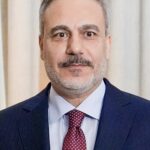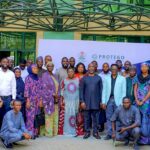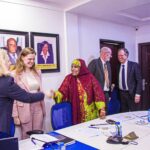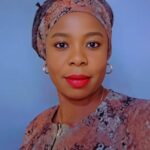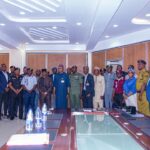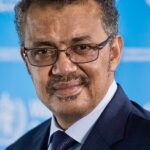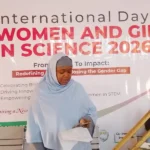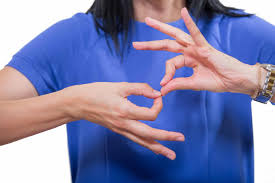By Fatima Mohammed-Lawal, News Agency of Nigeria (NAN)
For millions of Nigerians living with hearing impairment, visiting a hospital can be a daunting experience, often marked by confusion, frustration, and misdiagnosis.
However, experts and advocates argue that these challenges can be surmounted.
For them, a simple yet crucial solution is the presence of professional Sign Language Interpreters (SLIs) in healthcare facilities.

Across Nigeria, the absence of SLIs leaves deaf patients struggling to communicate symptoms, understand medical advice, or navigate complex treatment procedures.
Surveys and investigative reports reveal that only a small fraction of hospitals provide any form of sign-language support, with some studies indicating that fewer than 7 per cent of patients have access to interpreters.
In many primary and secondary health centres across states like Lagos and Abuja, interpreters are completely absent, leaving deaf patients to rely on family members or written notes to communicate with healthcare providers.
The situation in other African countries mirrors Nigeria’s challenges.
In Kenya, a few hospitals in Kisumu County employ SLIs, but nationwide coverage remains inadequate.
In South Africa’s Gauteng province, while some interpreters are available, many deaf patients still struggle to access them, especially for routine appointments or urgent care.
Overall, even where SLIs exist, their distribution is uneven, and the numbers are insufficient to meet demand.
These findings indicate that Nigeria is among the countries with the lowest availability of professional SLIs in healthcare.
According to the Nigerian National Association of the Deaf (NNAD), about 9.5 million Nigerians live with hearing impairment, while globally, over 70 million people rely on more than 300 distinct sign languages.
Yet, only a fraction of these languages is legally recognised, leaving many without access to professional interpretation services.
As a result, advocates say that the employment of trained SLIs in hospitals is not just a convenience but a lifesaving necessity.
“Most of the time there are misunderstandings and frustration on both sides,” said Mr Hassan Ridwan, Chairman of NNAD, Kwara Chapter.
“Healthcare workers cannot fully understand our needs, and our communities have lost people due to misdiagnosis.
“Others develop phobia about visiting hospitals because there is no interpreter to help us”.
Ridwan further alleged that the state government has overlooked the deaf community.
“When it comes to healthcare services, the government has sidelined us. No provision is made for sign language interpreters, which has increased our suffering both physically and mentally,” he said.

Similarly, Mr Ameen Ibrahim, Chairman of the Association of Sign Language Interpreters in Nigeria (ASLIN), emphasised the vital role of interpreters.
“Sign language interpreters are the lifeline of the deaf community, especially in the health sector.
“Without them, doctors may misdiagnose, and deaf patients struggle to explain their symptoms.
“Many have to rely on family members or private interpreters, who may not have professional training,” he explained.
Ibrahim noted: “Deafness is a silent and lonely world, expressive only with the help of interpreters. Improving access to professional sign language interpretation is not only a legal requirement but also a moral imperative.
“It ensures that Nigeria’s deaf community can seek healthcare safely, with dignity, and without discrimination”.
In addition, he urged the government to consider inclusive programmes across all public services, ensuring that deaf people are not left behind in healthcare, education, and social development.
“The presence of sign language interpreters is not a luxury; it is essential for life and well-being,” Ibrahim added.
Furthermore, Prof. Joy Shu’aibu, Country Director of Sightsavers Nigeria, highlighted the wider social consequences.
“People with disabilities are more likely to live in poverty and have limited access to education, healthcare, and employment opportunities.
“Sign language interpreters are essential for inclusion and ensuring that deaf persons can exercise their rights fully,” she said.
The Discrimination Against Persons with Disabilities (Prohibition) Act, 2018 guarantees access to healthcare and education without discrimination and mandates public institutions to provide accessible communication methods, including braille and sign language.
Albeit this, implementation remains inconsistent, especially in healthcare facilities.
Dr Monsuru Awodun, President of the Association of Resident Doctors, warned that ignoring these needs can have serious mental health consequences.
“Neglecting the deaf community can lead to depression, anxiety, or other mental health complications.
“Being unable to communicate effectively leaves them feeling stigmatised and isolated,” he said.
Therefore, he emphasised that healthcare delivery must include deaf patients, either through special clinics or by integrating interpreters into hospitals, to ensure accurate diagnosis and treatment.
Also, Mr Ibrahim Muftau, Kwara State Chairman of the National Association of Persons with Physical Disabilities, described healthcare access as “a frustrating experience” for his community.
“As a blind man, I often encounter lengthy waiting hours before receiving attention. Pregnant women with disabilities face high risks, and interventions such as Caesarean sections become even more daunting when communication is limited,” he said.
Similarly, Dr Abdulfatai Abdulazeez, President of the Association of Resident Doctors at Kwara State University Teaching Hospital, noted that while the government has shown some sensitivity, PWD communities must also be proactive.
“They should reach out to the government for assistance. It is their fundamental human right to access healthcare safely,” he said.
Globally, an estimated one billion people, or 15 percent of the population, live with some form of disability, with 80 percent residing in low- and middle-income countries.
Yet, sign language recognition and interpreter services remain inadequate in most regions, reflecting the challenges faced in Nigeria’s healthcare system.
Experts are urging the government and healthcare institutions to employ professional Sign Language Interpreters (SLIs), provide regular training for medical staff, and integrate disability-inclusive practices into health planning.
They added that ensuring SLIs in hospitals could greatly improve health outcomes and promote equity for deaf communities. (NANFeatures)
****If used, please credit the writer and the News Agency of Nigeria.

